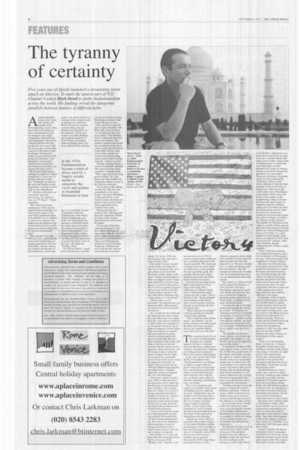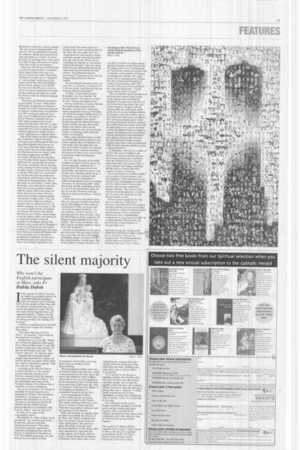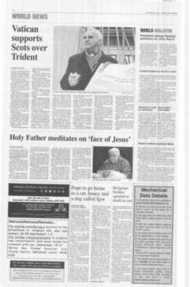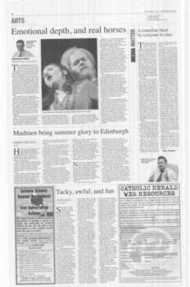Page 8, 8th September 2006
Page 8

Page 9

Report an error
Noticed an error on this page?If you've noticed an error in this article please click here to report it.
Tags
Share
Related articles
From Mr Mark Dowd — A Number Of Your Correspondents
Agnostic Dry-rot
" Rerum Novarum " I
Hips, Wealth And Women
The Battle The Church Knows She Has To Win
The tyranny of certainty
Five years ago.al-Qaeda launched a devastating terror attack on America. To mark the anniversary of 9111 Channel 4 asked Mark Dowd to probe fundamentalism across the world. His findings reveal the dangerous parallels between fanatics of different faiths Amilitant Buddhist monk in Sri Lanka who justifies the burning of the Norwegian flag. A gun-toting housewife from Tennessee who is determined to keep out strangers who might compromise biblical Protestant Christianity, followed by a British Muslim who tells me that his sect is one of the few true groups in Islam that conform to the truth of what the Prophet Mohammed wanted for his followers. His group, AI-Ghurabaa, ("the Strangers") was recently outlawed by Government anti-terrorism legislation, yet Anjem Choudary insists: "The Prophet Mohammed said that my followers will be divided into 73 sects and 72 of them will burn in hellfire." Chillingly, he refers to the men who carried out the September 11 attacks on New York as "the Magnificent 19". All these individuals are committed, dogmatic, unswerving. It's religion's very own "F-Word" — Fundamentalism.
The word has become synonymous with a narrow minded bunker mentality, but what are the origins of the term? Does fundamentalism exist globally or is it confined to one or two religions and, indeed, has the modem usage of the word evolved so much that we can even usefully talk of "secular fundamentalism"?
The concept is less than 100 years old, a phenomenon born in the United States of America just before the First World War. Darwin's theory of evolution and decades of liberal theology, whose hall
marks were intense historical criticism of the scriptures and an attempt to evaluate the Word of God in its original societal setting, had put Bible-loving Christians on the defensive. Ali the new trends in scientific thinking and academic analysis of God's Word were putting truth on shifting sands: was there nothing fixed, unchang
ing or even eternal? A series of pamphlets titled The Fundamentals were hastily drafted, defining the core truths: the Virgin Birth, the inerrancy of the Holy Book, the death, physical resurrection and second coming of Christ. The .pamphlets were dispatched to three million readers throughout America and then came the showdown to put the literalists' cause on the map — the infamous "Monkey Trial".
In 1925 in Dayton, a small town in Tennessee, a teacher was put on trial for teaching Darwinian evolution. John Scopes became a cause celebre and for 11 days the nation's press flocked to the Bible Belt. A live monkey was brought into the court room (hence "The Monkey Trial") to illustrate Darwin's theory of evolution. The teacher's attorney had a field day, teasing the prosecution counsel about the literal truth of the Bible. Did he really believe that a whale had swallowed a human being called Jonah or that God had made the world in six days?
William Jennings Bryan, a former Presidential candidate who represented the fundamentalists, stumbled badly: "Well, a day can mean a long period of time," he said. Black and white truths were ebbing into shades of grey in the Dayton courtroom.
Yet, in spite of this. Bryan won the day. The jury was sympathetic to his cause. Scopes was fined 100 dollars (a fine paid for by a civil liberties union), but Darwin's theory of the survival of the fittest appeared to have evidence on its side.
During the trial, the monkey died, suffering from heat and exhaustion. Within five days of his victory, Bryan himself went to meet his maker.
For decades Christians, who had preferred to "put their faithin the Rock of Ages rather than the ages of rocks", were happy to Call themselves fundamentalists. Take a stroll through any small-size town in Georgia, Tennessee, Alabama and you'll still see the word on more than the occasional
church. Yet, in the 1970s, the term became more and more a word of abuse. Why?
Put simply. because a largely secular media, searching for a neat way to categorise the views and actions of one Ayatollah Khomeini in Iran, began to talk about "Islamic fundamentalism". Bible worshippers in the United States hated the association and began to re-position themselves. The F-word was quietly dropped and now you will hear the likes of Jerry Falwell and the Coalition of the Moral Majority refer to themselves as "evangelicals".
Liberal critics are not persuaded. "Evangelicals are just fundamentalists with manners," one Tennessee university professor told me.
Yet, in truth, the Ayatollah and the American television evangelists had rather more in common than they were prepared publicly to admit. Both were engaged in a revolt against what they saw as godless humanism. In the United States the federal government had banned prayer in public schools and sanctioned widespread abortion after the Roe v Wade Supreme Court ruling. The Shah in Iran was so fiercely secularist that his guards used to patrol the streets and rip the veils off women as they walked the streets. Religion, for the Shah, was meant to be a guardedly private affair: but to many in Iran his approach looked like an attack on the sacred. By the late 1970s ihe Shah had been deposed and militant piety. a rebellion against the excesses of materialism, was well-established.
I have been visiting America since 1985 to make television documentaries and it strikes me that this type of entrenched religious outlook is now stronger than ever before. At its best it is benign, principled and full of integrity. It cleaves to a defence of absolutes in the face of a gnawing secular relativism that would seek to make all moral and ethical choices the preserve of individual preference.
It may even he that the majority of fundamentalists are this way inclined. We should then call them benign fundamentalists. But at its worst, fundamentalism engenders a sense of beleaguered defensiveness which comes across as insecure and, at times, even hostile.
June Griffin is a 57-year-old housewife and campaigner from Dayton, the scene of the "Monkey Trial". She threw out
her television set in 1970 in protest at programmes which she saw as attacking the heart of the American family. The recent gay marriage moves in some American States have so incensed her that she can hardly speak. She proudly calls herself a fundamentalist and asserts the literal truth of biblical revelation.
Outside her home high on the hills overlooking the town a large yellow flag with a rattlesnake on it flutters in the wind. Underneath the coiled serpent are the words: "Don't Tread on Me." In the tranquil surroundings of her home, June seems harmless enough, though occasionally she lets her guard slip.
"What's that you're wearing?" 1 ask her, pointing to a brightly coloured blue garment.
"This is what we call a holster apron," she explains. "In one pocket you put your Bible and in the other you keep your pistol just in case someone should come and catch you at the sink."
his constant desire to revel
ri7
in a state of embattlement, defining one's identity against evil forces "out there" and even the heresy within one's tradition, 1 found to be a constant psychological trait among all those who practise militant piety.
hi the wise words of the Chief Rabbi, Sir Jonathan Sacks: "Fundamentalism is an attempt to impose a single truth on a plural world and at its heart lies fear: a profound insecurity that makes you feel that when you meet someone who's not like you, or doesn't agree with you, that that challenges and threatens your very being."
This is not something one expects to encounter in the world of Buddhist ascetics. After all, the great "enlightened" one was adamant in his teachings that a pacific, non-violent approach to life was essential as human beings sought to minimise dhukka, a word which is best translated as a sort of restless disquiet in the mind that poisons the whole of life and leads to unhappiness and suffering.
Imagine my shock, then, to encounter film archive images of Sri Lankan Buddhist monks encouraging a mob of people to burn the Norwegian flag on the streets of Colombo. Since 2002, Norway has been trying to mediate a peace process between the LTTE Tamil Tigers and representatives of the Sinhalese majority on the island, and a number of a new breed of radical monks who describe themselves as "the new colonialists". A controversial new patty has been formed — the JHU comprised exclusively of monks who sit in parliament and advocate an unashamedly nationalist agenda.
One of them is a former forest hermit, Athuraliye Rathana, a man in his 40s who has a disarmingly open facial expression. He has moved to the big city to defend the Sinhalese tradition against outside forces: Tamil Tigers, meddling Norwegians and globalisation.
Over tea and cake in his rural enclave just outside the capital, he told me: "If 1 had been in Vietnam I would have fought the Americans, it would have been my obligation." I pointed out the contradiction with the pacifism normally associated with western stereotypes of Buddhism, but he was quick to put me in my place.
"The Buddha never established a precise set of rules and guidelines: the tradition is very flexible and has to be applied to present-day reality."
To the dismay of many of the more elderly monks, members of the 30,000 strong community of the Sangha, that reality includes the option of violence. Indeed, a number of the more entrenched monks play an almost elite role in their desire to co-ordinate the masses. Of course, when you're dealing with suicide bombings from Tamil extremists, it's not hard to understand why feelings become so impassioned. But there was a deeper fear which permeated our conversation.
"Outside economic forces are trying to change the country." Rathana explained. "Chinese money, Indian nuclear power. Fifteen years ago it was just America and Europe, but now the influences are truly global."
In an episode eerily redolent of the now infamous controversy over the Danish cartoons of the Prophet Mohammed, Buddhists have been enraged by attempts to utilise the image of their spiritual leader in a whole host of profit-making enterprises.
The Buddha has been used on adverts for bras with models sitting in a lotus position. Reports have also talked of Buddha cookie jars and there has been umbrage at the making of a film called Holly
wood Buddha. Arguments over freedom of expression can rage, however a constant theme that unites most of these expressions of militant piety is a profound conviction that a secular humanist plot wants to emasculate the sacred from human life and shows it scant respect. Moreover, the forces of globalisation, far from making the world more cohesive and united, threaten it with the bludgeoning sword of diversity. A century ago, folk here in Sri Lanka knew only of Buddhism and probably didn't know the names of the monks in the neighbouring village, but now they have the faith claims of umpteen religious traditions raining down on them via satellite broadcasting and the Internet. How else would one explain an irrational and shameless series of attacks on Christian churches in the country? The number of Christians in Sri Lanka is actually falling and yet there have been dozens of arson attacks on charity buildings and places of worship. In a small number of cases monks themselves are reported to have been involved in the violence. Athuraliye Rathana, though condemning the violence, spoke candidly.
"These Christian churches are coming here and they have a lot of money to offer people," he said. "And many people feel compelled to change religion."
His party has been pressing for an anti-conversion law to be passed by parliament to outlaw this heavy-handed proselytising. Notwithstanding the difficulties of making legislation like this operational, the JHll monks have been quite embarrassed by the antics of some nationalists who have struck out wildly against any kind of target that does not conform with their own image.
Fr Ignatius, of the Catholic church in Homagama, told me of a terrible attack in which hostile elements burst into his church with a petrol cannister and torched wooden pews, statues and even the Blessed Sacrament in the early hours of a Sunday morning. Word got round and the faithful turned up in record numbers for Mass outside the smouldering remains of what was once their place of worship. Did Fr Ignatius have any evidence of involvement by the radical monks?
"They were encouraging them," he told me. "I went to the police station afterwards and there was this monk and he was saying: 'You have no right to have that church there. You're just a few people and you don't even possess the documents that allowed you to build there.' I told him we had the property deeds."
Generalisations are always tricky, since one has to allow for local conditions and cultures as much as possible, but the religious F-word does seem to have an overarching uniting theme. Its militant protagonists, it seems to me, are attempting a new form of political ideology discarding nationalism, liberalism or even Communism, which they deem to have failed.
But look closer and the political ideologies remain , albeit laced with the sacred veneer of ancient texts and traditions in order to clothe the political imperative with religious credibility. And often what happens is that in the appeal to present one's stance as "orthodox" it is orthodoxy itself that goes out of the window.
, Former Catholic nun Karen Armstrong in her momentous book Battle lbr God. has chronicled the onwards march of religious anger in the 20th century. She points out that Ayatollah Khomeini in [ran was a classic example. "He was a typical fundamentalist," she told me. "He was unorthodox because, for centuries, Shiites had separated religion and politics as a matter of sacred principle. In declaring that a cleric could be a head of state, Khomeini was flying in the face of this sacred tradition."
Moreover. this theme of militant faith as a kind of mutant politics is nowhere better applied than in the case of alQaeda's Osama bin Laden. The media shorthand is to refer now to "Islamism" or "radical Islam" in the case of bin Laden and his like. But Fred Halliday, that inveterate analyst of the Middle East for more than 40 years, warns us that if we want to understand bin Laden and his al-Qaeda associates we would be unwise to take the religious language at face value.
"They have all studied Communism in great detail," he said. "Their whole philosophy of exporting revolution is straight out of the Communist book and its critique of imperialism and globalisation. He's saying our lands are occupied, our oil wealth has been stolen by greedy Western companies and our elites and governments have been imposed by the West. Now he's a cruel and demented person, but the core arguments that bin Laden is making and to which he appeals are simply modern secular arguments in a religious form."
One of Bin Laden's greatest admirers here in Britain is Anjem Choudary, previously chief spokesman for the now proscribed Islamic radical group, AlGlutrabaa. Choudary leapt to prominence earlier this year at the height of the Mohammed cartoons frenzy when he made an appearance on BBC's Newsnight. Despite the fact that there were five other studio guests, Choudary bulldozed his way through the shared discussion, chaired by Jeremy Paxman, rarely stopping to allow anyone to reply or make a point. I worked on Newsnight in the late 1980s and I am a keen devotee, but this has to be one of the most extraordinary performances I have ever wimessed on the programme. Also in the studio was the Islamic scholar, Tariq Ramadan, a man who has become the bete noire of young Islamic radicals with his clarion call for the reform of Islam, the need to embrace Western democracy and find common ground with people of other faiths. I was curious to see more of the two of them together than was allowed for in a 10minute exchange on Newsnight, so off we went to Sunrise Radio in Southall and filmed a 90-minute radio debate between the two of them. Depressingly it was the elderly callers who phoned in to support Ramadan's moderate message of conciliation whereas the younger voices spoke up for Choudary's vision of a militant Islam that warned London 7/7 would happen all over again if we didn't get soldiers off Muslim soil. Time and again, key to Choudary's psychology it appeared, was the need for distinctiveness and separateness. These were familiar arguments: reli
gious people were under attack in a secular world, Islam was threatened by the West. His own small "sect" was outnumbered by other heretical Sunni and Shiite groups which had departed from the chosen path. There was no such thing, he claimed. as "the brotherhood of all humanity" and in the great battle between truth and falsehood, the clash would be both intellectual and military. Tariq Ramadan became increasingly exasperated at the ideology being propagated by his Muslim brother.
"If a non-Muslim practises justice, in your view, is it Islamic, is it justice or is it kufr (an Arabic word from the Qu'ran meaning falsehood/disbelief)?"
"It's kufr," responded Choudary. Ramadan's face was a picture. He turned crimson. "I'm sorry to say this," he said. "You are the danger for us."
Several weeks later, it seemed that the Government had concurred with Ramadan. Al-Ghurabaa, which had openly paraded the message "Kill those who insult the Prophet Mohammed" on its website, was outlawed. Several of the group's members who carried threatening placards during February's demos over the cartoons, advocating death to the infidels who took the prophet's name in vain, are now facing charges of soliciting death and incitement to racial hatred.
Many, many Muslims I know would run a mile rather than be tarred by association with the likes of Choudary, but what makes him and others the way they are? I refuse to believe it is the religion itselfi Islam is just too pluralistic and diverse for there to he a monocausal explanation rooted in its theology framework.
As I sat with Choudary in his neighbourhood of Ilford in East London, my mind temporarily wandered and I thought of the Tennessee housewife, June Griffin, and reflected on how similar they were. Identities shored up by a feeling of being in a minority elite, sacred texts at one's fingertips to rubber-stamp agendas and an unyielding conviction of "possessing truth" rather than living with the uncertainty of truth as a goal to be pursued that might one day set one free. Products of an age, indeed, in which many betray a "lust for certainty".
I first came across that phrase more than 15 years ago. A rather bored looking Dr John Hapgood, then Anglican Archbishop of York, was being interviewed by Jonathan Dimbleby, who was seeking a "yes/no" answer to a pressing question about doctrine. After the third failure to elicit a response, Dr Hapgood smiled pitifully at his interrogator: "Has it ever occurred to you that a lust for certainty might be a form of sin, Mr Dimbleby?"
In times of uncertainty we all want to put down roots. We seek signs of assurance, roots that will tide us through e debilitating change around us: No this a phenomenon, I would argue, that is tied simply to religion, though as we saw, the F-word has its origins among anxious Christians in the United States. For better or for worse "Fundamentalist" has become a name for anyone who is dogmatic and incapable of listening or entering into dialogue. We might regret, from a language-purity perspective, the evolution and morphing of words over generations, but Lewis Carroll's Alice had a fair bit going for her when she blurted out: "A word means what I want it to mean!"
Thus it is that this most contentious of terms has now passed to the secular world. Anyone who saw Richard Dawkins's two-part series The Root of All Evil on television earlier this year would struggle to disagree with the assertion that one could speak intelligently now of secular fundamentalism: an attempt to force the evidence into a neat black and white matrix of religionbad versus non-religion-good. I have questioned Dawkins about his presentation of this facile take on the sacred and he denies that it was ever his intention to paint all religious belief in a negative manner. Yet harping back to that theme of being beleaguered and embattled it does appear, at least to this observer, that the celebrated Oxford scientist acquires more than a little psychological fillip from his ongoing reputation as the scourge of believers.
As Christians, what are we to make of all this? We must be faithful to the pattern of revelation and that does not mean cherry-picking neat soundbites from the Scriptures for our own predetermined ends. But it means that we must celebrate uncertainty, confusion and the desire to search with little promise, at times, of arriving.
God consistently is revealed in biblical accounts of desert absence, trial and emptiness. Time and again we are regaled with what happens to individuals who claim to have God in their pockets only to have committed heinous idolatry. "My God my God, why have you forsaken me", is not the cry of a man who claims he has the divine Creator on side.
If that is good enough for He who shows us the face of the divine Creator, a God who loves this maddening and confusing diverse world, then we should he content to embrace doubt and uncertainty, not as occasional distractions, but as fundamental companions in our journeys of faith. In a fundamentalist-driven world, the need for this counter-witness is stronger than ever.
Mark Dowd was the winner of !lie 2006 Churches Media Council Andrew Cross Award for religious broadcasting. The Fundamentalists will be shown on Channel 4 an Saturday September 9 at 7.15pm
blog comments powered by Disqus

















